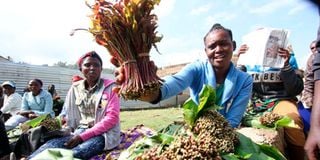Turbulence hits planned miraa flights to Somalia

Miraa exporters may have to wait longer before flying their produce to Mogadishu due to requirements set out in new regulations, a day after Kenya and Somalia agreed to resume exports of the stimulant.
Miraa exporters may have to wait longer before flying their produce to Mogadishu due to requirements set out in new regulations, a day after Kenya and Somalia agreed to resume exports of the stimulant.
Traders and farmers have welcomed the reopening of the Somalia market but called on the government to speed up the issuance of export licences as per the regulations.
Kenya and Somalia revived bilateral relations on Friday after President Hassan Mahmud met President Uhuru Kenyatta and agreed that trade and flights between the two countries resume with immediate effect.
But for the first time, miraa dealers will be required to adhere to the Crops (Miraa) (Amendment) Regulations, 2022 and the Kenya Bureau and Standards Code of Practice.
500 exporters yet to be cleared
Nyambene Miraa Trade Association Chairman Kimathi Munjuri on Saturday said the Agricultural and Food Authority (Afa) was yet to clear about 500 exporters.
According to the regulations, exporters must be registered and licensed by Afa. Exporters are also required to get an export permit for every consignment. Anyone who exports miraa without a licence is liable for a prison term of up to three years or a fine of up to Sh5 million
“We have over 500 exporters who have applied for the export licenses but Afa is yet to issue them. We need them urgently because we cannot ship without adhering to the regulations,” Mr Munjuri said.
Amended regulations
Agriculture Cabinet Secretary Peter Munya recently gazetted the amended regulations, scrapping an export and import levy of Sh30 and Sh60 per kilo respectively.
The regulations also provide for the registration and licensing of miraa nursery operators, growers’ associations, aggregators, transporters, importers and vendors. It also regulates the quality of planting materials, production, post-harvest handling and transportation.
Transporters are required to use well ventilated and hygienic vehicles in adherence to food safety standards.
The rules also establish a miraa pricing formula committee, which will be tasked with coming up with a pricing method based on supply and demand, cost of production and other factors.





